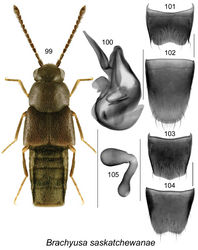Brachyusa saskatchewanae
| Notice: | This page is derived from the original publication listed below, whose author(s) should always be credited. Further contributors may edit and improve the content of this page and, consequently, need to be credited as well (see page history). Any assessment of factual correctness requires a careful review of the original article as well as of subsequent contributions.
If you are uncertain whether your planned contribution is correct or not, we suggest that you use the associated discussion page instead of editing the page directly. This page should be cited as follows (rationale):
Citation formats to copy and paste
BibTeX: @article{Klimaszewski2016ZooKeys, RIS/ Endnote: TY - JOUR Wikipedia/ Citizendium: <ref name="Klimaszewski2016ZooKeys">{{Citation See also the citation download page at the journal. |
Ordo: Coleoptera
Familia: Staphylinidae
Genus: Brachyusa
Name
Brachyusa saskatchewanae Klimaszewski & Larson sp. n. – Wikispecies link – ZooBank link – Pensoft Profile
Holotype (male)
Canada, Saskatchewan, Bear Creek at Crane Lake, near Piapot, 18-VIII-2011, D. Larson (LFC). Paratypes. Canada, Saskatchewan, Grasslands National Park, Frenchman River at Ecotour Rd., 26-VII-2004, sandy-clay river bank, D. Larson (DLC) 1 male; Bigstick Lake, 16 km E Golden Prairie, 21-IX-2011, D. Larson (DLC, LFC) 4 females.
Etymology
The name of this species, saskatchewanae-, is a feminine adjective derived from the name of the province of Saskatchewan, where the type series was found.
Diagnosis
Body narrowly oval, length 2.3-2.5 mm, slightly flattened; uniformly black with light brown tarsi (Fig. 99); integument moderately glossy with short and silky pubescence (Fig. 99); antenna with articles I-VII elongate, VIII-IX subquadrate to slightly transverse (Fig. 99); head distinctly narrower than elytra and with large eyes, postocular region very short and abruptly narrowed basally (Fig. 99); pronotum wider than head but narrower than elytra, sinuate baso-laterally and strongly converging apically in apical third, pubescence directed straight and obliquely posteriad (Fig. 99); elytra at suture about as long as pronotum, pubescence directed straight posteriad, basal margin concave (Fig. 99); abdomen strongly narrowed posteriad, three basal tergites with deep transverse impressions (Fig. 99); metatarsus with basal article less than twice as long as second (Fig. 99). MALE. Tergite VIII transverse with broad apical emargination (Fig. 101); sternite VIII strongly elongate, with wide space between base of disc and antecostal suture, apical margin rounded (Fig. 102); median lobe of aedeagus with very long and narrow tubus in lateral view, bulbus large with large crista apicalis (Fig. 100). FEMALE. Tergite VIII slightly triangularly produced at apex (Fig. 103); sternite VIII with shallow apical emargination (Fig. 104); spermatheca L-shaped, with sac-shaped capsule angularly connected to club-shaped stem (Fig. 105).
Brachyusa saskatchewanae may be distinguished from other Brachyusa species by its uniformly black and narrow body, sinuate lateral margins of pronotum, and the genitalic features described above (Figs 99, 100, 105).
Distribution
Known only from SK.
Natural history
All SK specimens were captured near water with some on sandy-clay river bank. They were mainly collected by splashing water onto the bank, which caused the beetles to run up the bank.
Original Description
- Klimaszewski, J; Larson, D; Labrecque, M; Bourdon, C; 2016: Twelve new species and fifty-three new provincial distribution records of Aleocharinae rove beetles of Saskatchewan, Canada (Coleoptera, Staphylinidae) ZooKeys, (610): 45-112. doi
Images
|
